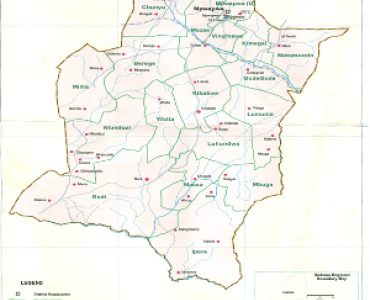Forestry.
The forestry sector plays an important role in maintaining ecological balance, soil protection from erosion and conservation of water, wildlife and our livelihood. Moreover, forests are a source of industrial raw materials and provide wood and non-wood products such as honey and beeswax. Thus, failure to maintain or improve forest resources eventually will lead to problems of unsustainable livelihood.
Mpwapwa district has one of the best forest covers and ranks first among districts in the region. The forests cover about 10.4 percent of total land area. Until 2011, out of 737,900 hectares of district land area, about 76,448 hectares (10.4 percent) of land is covered by natural forest reserves.
These natural forest reserves are owned by National forests reserves (Central government) (67,422 ha) and village governments (9,026 ha). National forests cover of 3,237 hectares depicted in Lumuma, is shared by three wards, Lumuma itself, Luhundwa and Mbuga. Unfortunately, though the government has imposed protection measures against forest depletion, the district forests cover is under pressure due to overgrazing, agricultural activities, fuel wood utilization and expansion of human settlements especially in Mpwapwa Urban.
In addition to natural forests, the district has plantation forests. According to Agriculture Sample Census report, in 2002/03 the district had the largest number of trees planted than any other district in the region (50.6 percent). Most of trees planted were Eucalyptus.
Various institutions had been involved in tree seedlings. Moreover, in five years period 2005/06 to 2010/11 a total of 3,729,153 tree seedlings raised with more than half (2,034,211 tree seedlings, 54.5 percent) being raised by Jitume Foundation.
Creeping desertification is the single most important threat to Mpwapwa environment whose causes include the uncontrolled felling of trees for timber, fuel and agriculture.
The depletion of ground cover due to uncontrolled concentration of livestock and the destruction of cover at water sources do also contribute to desertification. In an effort of alleviating the problem, several community organizations were introduced with a task of sensitizing communities on environmental issues, tree planting and providing land management skills. Religious and international organizations were also involved .
Forest Products
Forest products such as timber, poles and charcoal earn revenue to the government through permits and taxes. Experience has shown that demand of timber and poles as well as revenue collection from those materials do increase in recent years due to significant increase in houses covered with iron sheets in the district.
On other way round, revenue collected from charcoal also increased as many people afford using charcoal rather than electricity and gas for cooking. Unfortunately, lack of reliable data collection system lead to unavailability of data on revenue earned by the district through tax collection from timber, poles and charcoal respectively.
Wildlife
Mpwapwa district has one Game Controlled Area which covers a total area of 136,000 km2 and is found in three wards, Rudi, Massa and Ipera. The diversity of wildlife animals found in this area are elephant, giraffe and zebra. Great Ruaha river which is close to the game area is a home of crocodiles.
Beekeeping
Natural forests cover available in the district has a great potential for bee keeping. The sector is still under developed due to lack of know-how and modern technology. This result the existing potential of this economic activity not fully exploited.
The district has relatively fewer number or no modern beehives as compared to tradition beehives. This situation has led to low production of honey and bee – wax within such sector. Tradition beehives are mainly made by carved logs.
Traditional beehives summed at 865, Lumuma ward found to have the largest number of those type of beehives while Kibakwe ward took the lead in modern beehives (summed at 330).


Mpwapwa - Dodoma, Tanzania
Anwani: S.L.P 12
Simu: 255 26 2320122/2320
Simu ya Kiganjani: 0684705551
Barua pepe: info@mpwapwadc.go.tz
Copyright © 2021 Mpwapwa District Council . All rights reserved.